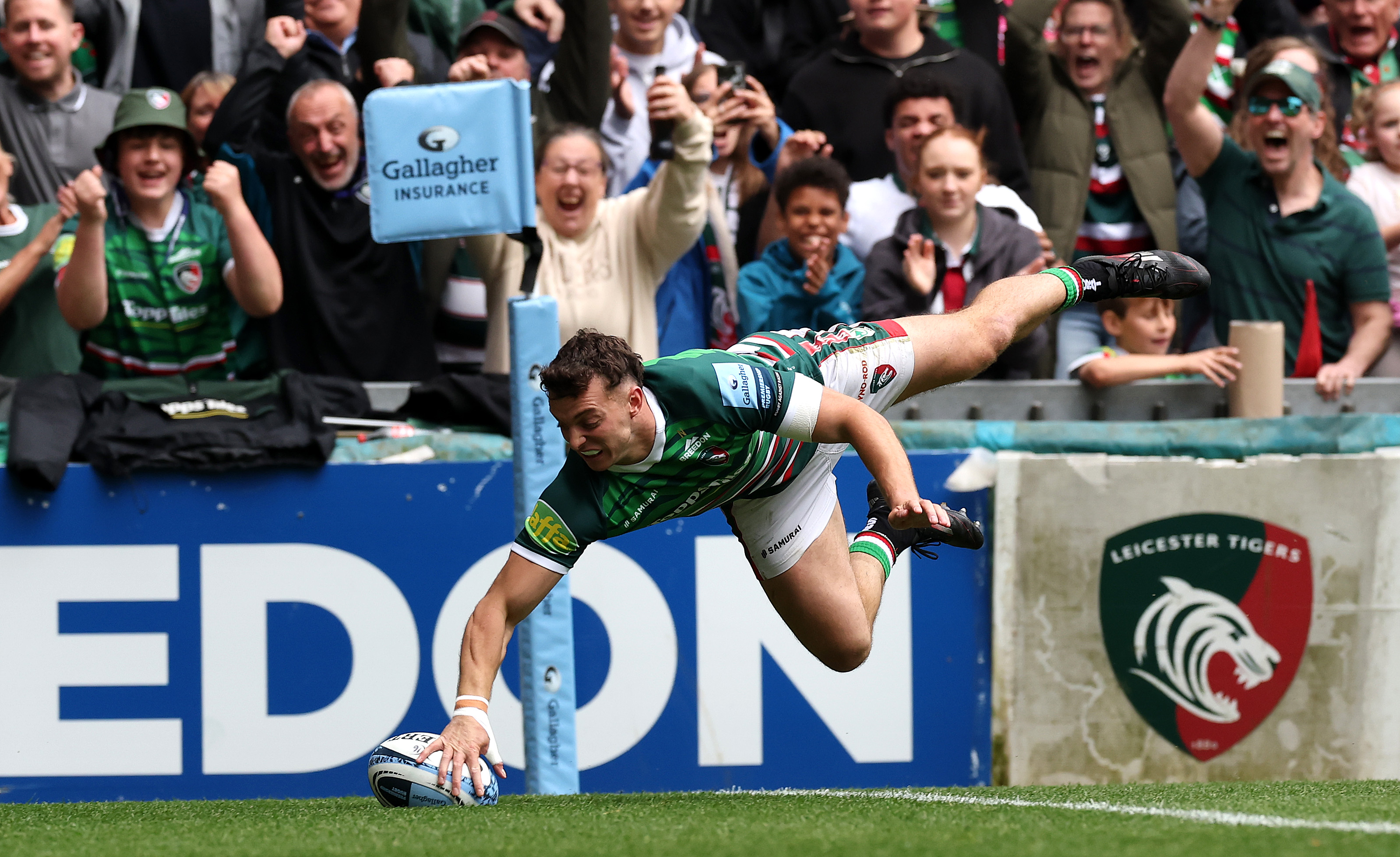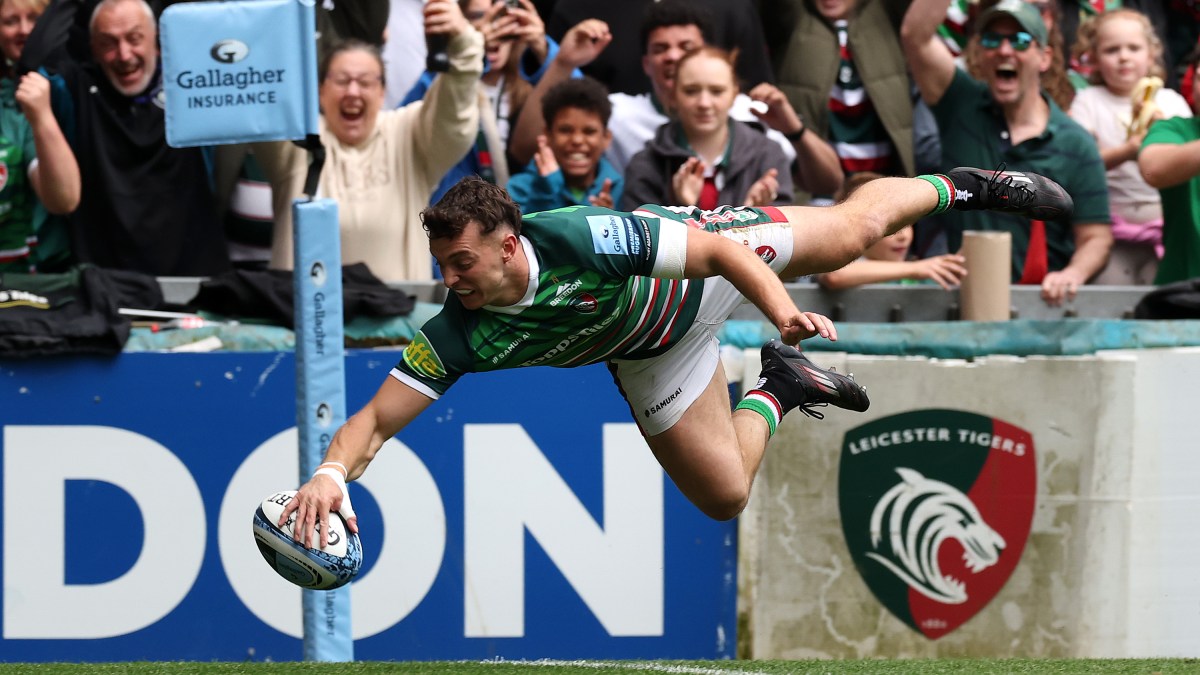So now we can sit in a dark room for some peace and quiet and to restock our oxygen levels. The most rapid, try-festooned and even dazzling season in the history of English rugby is over. We should be grateful that heartbeats can be restored to proper levels.
Every team ran the ball, often like crazy. Throughout history, when a long kick would find the opposing full back on his own, the way forward was obvious. Head down, foot up, kick safely to touch and start again. But in the season just ended, there was an overwhelming likelihood that isolated or not, the No15 would set off on a counterattack, electrifying the crowd. Sometimes it was doomed, with the player caught and penalised, but more often, after sumptuous movement, it would all climax at the other end with a try.
You swear that the Premiership season produced the most risk-taking players who ever played the game. Among them I would rank Gabriel Ibitoye, the magnificent Bristolian; Adam Radwan of Leicester, who swallowed-dived through the air to catch a misplaced kick and hit the deck to score last week; Kalaveti Ravouvou, Bristol’s Fiji dasher; Arron Reed of Sale Sharks; and Ollie Hassell-Collins of Leicester.

Radwan scores against Sale in Leicester’s semi-final victory
GETTY
There are even more that come to mind: Christian Wade, back from the NFL and scoring for fun; or the orchestrators such as Finn Russell and Handrè Pollard. They should have come out wearing a ringmaster’s top hat, just to show who was bossing it all.
The number of points scored was incredible, so too, in many weeks, the drama. It is said that attendances and television audiences are considerably up, which is the sort of announcement everyone makes at the end of a season, but this time, there was substance to the claims.
And you only have to be a historian of medium repute to recall that the Premiership was once denounced by southern-hemisphere coaches and followers for its plodding, scrummaging slowness. Admittedly, some of that was through fear because, now and again, our powerhouse packs in Europe would take the deep south to the cleaners, but it is true that not so long ago, a 14-6 result was seen as a gaudy afternoon out.
And now that stern group of men, the head coaches in the Premiership, have blinked and simply joined the party. There was hardly a team who did not throw caution, and the ball, to the wind. Bristol did not achieve the ultimate in taking the Premiership, nor did they reach the final, but in many ways they typified the devilish, heart-stopping thrill of the chase for tries from any part of the field. I doubt if those who poured into Ashton Gate all season were totally downcast when their team did not come home with the trophy.

Ibitoye was the season’s joint top tryscorer with 13 tries for Bristol
GETTY
Where did it all spring from, how long will it last, and will the Lions pick up the baton? The answer to the final part of the question is that they should do only what it takes to beat Australia in the Test series. There is also a factor apart from the expectations of the coaches and followers. At the end of every season for decades and decades, the pitch itself had green borders down the side and in the in-goal area, but the rest was brown. It was either brown with dried mud, or dark brown with wet mud.
The advance in turf technology has been profound, one of the most significant aspects of modern rugby. Anyone above the age of 15 will recall that groundsmen left the grass to grow long and longer, to ward off frost in the days before the technology threw up covering and de-icing. At Twickenham you could walk on the field and your Wellington boots would almost disappear below the level of the grass. To play on billiard tables now, retaining the baize-like green till the end of the season, is a profound change and a goad to keep the ball in play and to run with it.
But the game has also been driven to speculation and attack. It has become incredibly difficult these days to slow the game down and to protect a lead. There was a mini-era when it was easier for jackallers to turn the ball over at the bottom of rucks, whereas this season if you took away the amazing Jack Willis of Toulouse, the jackallers went hungry.
These days, the referees are so finicky about the action at the tackle and the breakdown, so welded into stopping the stoppers, that even the shoddier teams can keep the ball and keep it in play. The contest for possession at the tackle is now less of a contest, more of a foregone conclusion.
There were other ways to protect a lead and to keep the opposition at arm’s length. The driving maul was won, but now that they let the defending side crawl up and around and through the maul to insinuate themselves into the attacking drive, they let them get away with it. Referees will say that a player was legal “as long as he retains his bind”. Drivel. How can you be three yards upfield, spoiling possession, and still retain your original bind on your colleague?
The driving maul is in the mortuary along with the rest. And because the attacking scrums are now no such thing, because the referee demands the ball is played just when the superior scrum is getting really interested, the team with the superior scrum cannot shut it down that way either.
The game is now so weighted in favour of the attack that lawmakers and lawbreakers are united in claiming that speed of the ball and of the attack is everything; change of pace used to be more attractive than raw pace, now even the better games resemble an episode of the Keystone Cops — for reference, they were a bunch of policemen always rushing round like mad, not always to great purpose.

Bath pair Finn Russell and Ben Spencer orchestrated their team’s attacks
GETTY
But it was permissible and even essential to have days when you were carried away by it all. Bath, Bristol and Gloucester could take the breath away; Leicester came to the party towards the end of the season; and Saracens, fighting against a barrage of injuries, could also turn it on. There can be no doubt that people new to the sport were attracted by it, and the climax on Saturday at Twickenham was sold out way quicker than any other final since the great Martin Johnson appeared for his last big game in 2005, and everyone wanted to be there when he did.
The Premiership has lost three teams in the recent past. And in passing, it is a shocking blight on rugby that so many feel the need to castigate Wasps, Worcester Warriors and London Irish for what they appear to believe are criminal activities. In fact all that happened was that they boldly tried to put themselves on firmer ground only for the pandemic to come along and drain their incomes at the very point when they were desperate to double and treble them.
There appears to be opposition at the idea that Worcester, bless them, will be back in the rebranded Champ Rugby (second tier) next season; those critical of Wasps can only found their criticism on naked and rampant jealousy. Wasps are one of the greatest clubs: look around the Premiership now and you will find hordes of players produced at the Wasps’ academy and brought forward by Wasps.
Indeed, the Premiership will only be complete again when Worcester and Wasps are revived and back in the division. The one pathetic aspect of the Premiership is that it has reduced itself to ten clubs, with no significant national area representation, and is smugly sitting on the ten to divvy up the proceeds to their own advantage.
However much on the field the game has become brilliant, the attitudes of Premiership Rugby, the governing body, remain despicable, self-serving, and a shocking blight on professional rugby.
They have continually put blocks in the way not only of teams joining the division through promotion (or through the relegation of poor Premiership teams), but they have also, by their intransigence, made it horribly difficult to establish a Division Two — the most vital component missing from English rugby.
And so while the Premiership has delighted so many, it has done nothing whatsoever to improve the general wellbeing of English rugby. There is now a proper and energetic body planning the second tier, reviving the most oppressed of sporting leagues. It is scandalous, too, that the Premiership will not sit down in one room to talk about a Premiership Two, and that apparently they had no reaction whatsoever on the record after the recent announcements from the Division Two panel that they are making progress.
So what a choice we have. We can carry on revelling in Gabriel and all his angels with their devastating pace and skills; or we can be dragged down by the knowledge that pompous and self-serving behaviour by a cabal of bigger clubs is stopping the whole thing from flowing gloriously on into the future.
